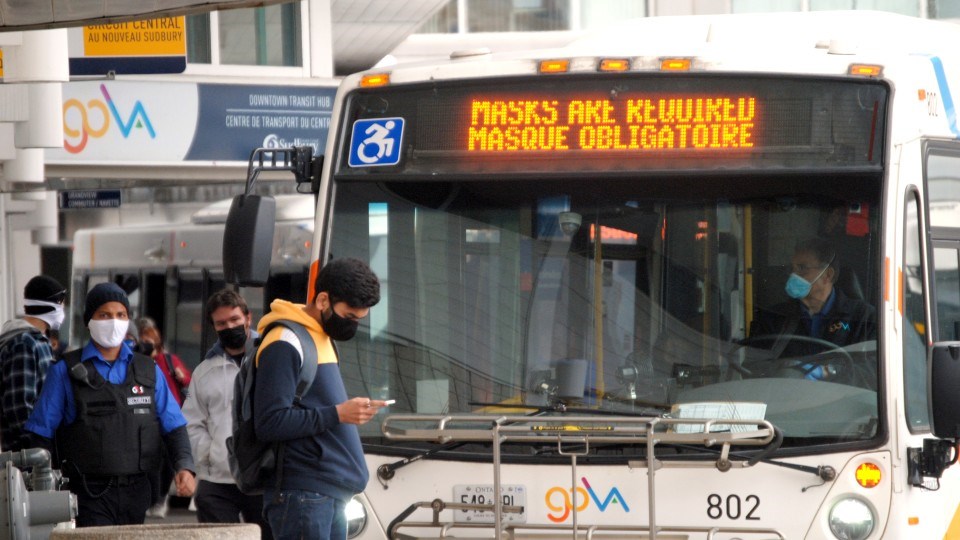Dusting off a point of advocacy, the local chapter of the Canadian Association of Retired Persons is again pushing for free public transit service for seniors.
“It’s a quality of life thing for that particular segment of the population,” Canadian Association of Retired Persons interim chair John Lindsay told Sudbury.com.
“A lot of seniors don’t go out of their home in the wintertime because they’re not sure of the transit and they’re not sure of the snow conditions.”
Aiding in their advocacy this time around is that the City of Brampton began allowing seniors to ride Brampton Transit free of charge beginning last week.
“This is a milestone in transit affordability and caring for our senior residents,” Brampton Mayor Patrick Brown said in a media release issued by the city. “Brampton is a Green City, and as part of our 2040 Plan we’re committed to providing efficient, affordable and sustainable transit through our Brampton Transit network.”
The shift to free public transit for seniors is part of that city’s goal of reducing greenhouse gas emissions generated in the city by 80 per cent by 2050.
The City of Greater Sudbury’s Community Energy and Emissions Plan has set a target of net-zero carbon emissions by 2050.
“If Brampton can do it, why can’t Sudbury?” Lindsay asked, adding that in addition to the environmental positives associated with greater public transit use are the mental and physical health improvements that come with seniors being out and about in the community.
The local association has long advocated for free public transit for seniors, he said, noting that they’d originally recommended free transit for seniors at off-peak hours every day of the week and all day on weekends.
In 2016, the city hosted a pilot program in which they offered free transit and handi transit to seniors over the age of 65 on Mondays beginning on March 1, during which approximately 16,500 conventional rides and 2,350 handi transit rides were recorded.
A business case city administration drafted at the time for 2017 budget deliberations noted that it was unclear whether ridership had increased due to the definition of seniors changing from 55 to 65 during the same time period. As such, they lacked comparable data.
The city’s selection of Monday as a pilot day is also problematic, Lindsay said, as it “isn’t a particularly great day for restaurants or general shopping.”
During 2017 budget deliberations, Greater Sudbury city council opted against making free transit for seniors on Mondays permanent. The annual cost estimate for the change was estimated at $100,000.
In the city’s draft 2022 budget document, it’s estimated that there will be 2.6 million passenger GOVA Transit trips in 2022. The net budget for public transit was set at $18.4 million, and user fees are projected to contribute $8.7 toward public transportation operations this year.
Ward 4 Coun. Geoff McCausland, who serves as chair of the city’s community services committee, said that he agrees that the service’s price scheme should be evaluated, but that he’s wary about blanketing all seniors as being in need of free public transit service.
He points to a Statistics Canada report from 2019 that clarifies the baby boomer and older generations have a greater net worth than the millennials and generation X-ers, on average.
“This whole price scheme that we have hasn’t really been looked at in a long time, and I believe we need to think strategically and think about the outcomes that we want to achieve,” he said.
“I see those outcomes as being economic development, of seeing transit supporting workers and businesses in Greater Sudbury, our population health goals as well as meeting our Community Energy and Emissions Plan goals.”
Mayor Brian Bigger shared a similar sentiment, noting that a much broader picture needs to be looked at than strictly the senior population.
The pilot program was looked at, and he said the city found other ways of improving the public transit system that didn’t involve doing away with user fees. The shift toward GOVA Transit wasn’t just a rebranding, he said, pointing to numerous efficiencies along the way. This included making public transit vehicles more accessible to people with mobility issues.
“The thing that has the biggest impact on ridership is convenience,” he said. “More so than the price.”
Any significant change to the GOVA Transit price structure would have to be determined by whatever incarnation of city council is elected on Oct. 24, he said, since it would require both a business case and a vote of city council in 2023 budget deliberations, which typically conclude in March following election years.
“Any significant change or offerings of free services has a cost,” Bigger said. “There’s an impact that eventually ends up on the tax levy.”
Tyler Clarke covers city hall and political affairs for Sudbury.com.
